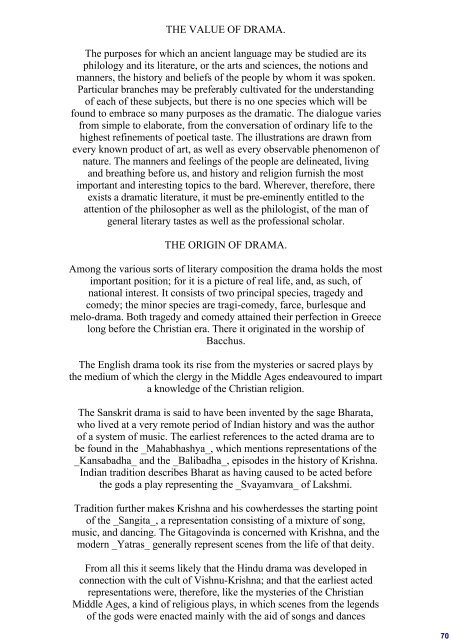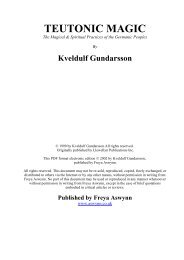TALES FROM THE HINDU DRAMATISTS - Awaken Video
TALES FROM THE HINDU DRAMATISTS - Awaken Video
TALES FROM THE HINDU DRAMATISTS - Awaken Video
You also want an ePaper? Increase the reach of your titles
YUMPU automatically turns print PDFs into web optimized ePapers that Google loves.
<strong>THE</strong> VALUE OF DRAMA.<br />
The purposes for which an ancient language may be studied are its<br />
philology and its literature, or the arts and sciences, the notions and<br />
manners, the history and beliefs of the people by whom it was spoken.<br />
Particular branches may be preferably cultivated for the understanding<br />
of each of these subjects, but there is no one species which will be<br />
found to embrace so many purposes as the dramatic. The dialogue varies<br />
from simple to elaborate, from the conversation of ordinary life to the<br />
highest refinements of poetical taste. The illustrations are drawn from<br />
every known product of art, as well as every observable phenomenon of<br />
nature. The manners and feelings of the people are delineated, living<br />
and breathing before us, and history and religion furnish the most<br />
important and interesting topics to the bard. Wherever, therefore, there<br />
exists a dramatic literature, it must be pre-eminently entitled to the<br />
attention of the philosopher as well as the philologist, of the man of<br />
general literary tastes as well as the professional scholar.<br />
<strong>THE</strong> ORIGIN OF DRAMA.<br />
Among the various sorts of literary composition the drama holds the most<br />
important position; for it is a picture of real life, and, as such, of<br />
national interest. It consists of two principal species, tragedy and<br />
comedy; the minor species are tragi-comedy, farce, burlesque and<br />
melo-drama. Both tragedy and comedy attained their perfection in Greece<br />
long before the Christian era. There it originated in the worship of<br />
Bacchus.<br />
The English drama took its rise from the mysteries or sacred plays by<br />
the medium of which the clergy in the Middle Ages endeavoured to impart<br />
a knowledge of the Christian religion.<br />
The Sanskrit drama is said to have been invented by the sage Bharata,<br />
who lived at a very remote period of Indian history and was the author<br />
of a system of music. The earliest references to the acted drama are to<br />
be found in the _Mahabhashya_, which mentions representations of the<br />
_Kansabadha_ and the _Balibadha_, episodes in the history of Krishna.<br />
Indian tradition describes Bharat as having caused to be acted before<br />
the gods a play representing the _Svayamvara_ of Lakshmi.<br />
Tradition further makes Krishna and his cowherdesses the starting point<br />
of the _Sangita_, a representation consisting of a mixture of song,<br />
music, and dancing. The Gitagovinda is concerned with Krishna, and the<br />
modern _Yatras_ generally represent scenes from the life of that deity.<br />
From all this it seems likely that the Hindu drama was developed in<br />
connection with the cult of Vishnu-Krishna; and that the earliest acted<br />
representations were, therefore, like the mysteries of the Christian<br />
Middle Ages, a kind of religious plays, in which scenes from the legends<br />
of the gods were enacted mainly with the aid of songs and dances<br />
70
















